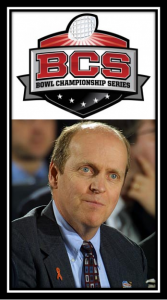The Department of Justice is currently investigating the BCS, the OPEC of big money sports, and NCAA President Mark Emmert and BCS Director Bill Hancock are doing little more than playing the denial and ignorance game.
The Fiesta Bowl’s egregious offenses (and the slap-on-the-wrist ruling that followed) have called attention to corruption within the BCS. And now the Feds are investigating the cartel’s possible involvement in anti-trust behavior. This is very much about economics and markets, and less about football. So this article continues first and foremost in the vein of “the dismal science,” and not the gridiron.
You don’t need a MBA to understand this, but since I am one, I’m actually really excited about this story and hope to convey that ebullience over to you the reader in breaking this down.
A must read comes from this ESPN article by Andy Schwarz, who drafted the economic arguments in a letter recently sent to the U.S. Department of Justice requesting an antitrust investigation into college football’s Bowl Championship Series, which the DOJ cited in recent inquiries to the NCAA questioning the lack of a playoff system.
By Paul M. Banks
Schwartz writes:
the antitrust laws frown upon collective actions among competitors that are not needed to create new products or that make it harder for new competitors to enter the market. This is where the BCS raises several red flags.
The BCS has taken four independently produced, successful products (the Rose, Sugar, Orange and Fiesta Bowls) and cartelized them, turning them into a joint product where there is no economic competition among those Bowls. This has many bad effects, but the biggest problem is that the BCS has locked up the eight teams most likely to form a rival playoff system.
Yes, I know the game is played on a green rectangle which reminds us all just how much it’s all about the dough, but there is a more fair and equitable way for everyone to get their pieces of that fat pie. We all know America is all about “free markets” and the idea of economic “pure competition.” Both ideals are obviously fallacies, probably in theory as well as in practice. (but that’s a whole another article, the U.S. economy is anything but a “free market”).
Another American ideal is Social Darwinism, which is the idea of cutthroat, all-out competition taken to it’s highest level. Other than in the military, nowhere in American society is that ideal of Social Darwinism more prominent than football. Perhaps this is why the military and football are joined at the hip. But it’s time to let that ethos work it’s magic in doing some good old fashioned trust-busting, and then let the best system and plan rise to the top.
Quoting Schwarz again:
To make matters worse, the BCS conferences, through their control over the FBS, all agree that if any four teams choose to join a playoff system, the other 116 teams in FBS will refuse to play against them indefinitely. This is a collective boycott, and it’s rarely legal. But it is BCS/NCAA policy, enforced with specific bylaws that limit FBS teams to one postseason game and that prohibit the other schools from playing against schools that violate this rule, even in sports other than football.
The argument for a college football playoff is similar to the argument for universal health care. For what seems like ages, there has been an overwhelming demand by most people. It’s the right and just practice to implement, it benefits almost everybody, but a small band of narrow-minded but extremely powerful interests hold us back. The big pharmaceutical and insurance lobbies spend a lot of money to pollute minds and influence congress into keeping the archaic system in place, much like the moneyed interests of the BCS -the commissioners of the Big 12, Pac 10, Big Ten, and Big East especially- keep the inequitable bowl system in place.
The Kennedy Proposal is a plan which keeps the bowls, and makes them into a legitimate playoff.
Going back to Schwarz:
it would sever the ties between the BCS Championship Game and other bowl games. There are simpler, more competitive ways to ensure that the Rose Bowl and others would release the two top teams to the BCS. By doing this, the DOJ would make quality teams available to a playoff and prevent the BCS from locking up all potential rival champions. This would allow an entrepreneur such as Mark Cuban, a network such as ESPN, or the NCAA itself to develop a playoff in competition with the BCS.
And if/when the DOJ hands out their ruling, you’ll finally have the barriers broken that can allow markets to function normally. You can have healthy markets in place that keep traditions in tact while moving forward. One of the best football examples originated from my alma mater, the University of Illinois. When superstar halfback Red Grange was done with school in the 1920s, professional football leagues were considered an abomination at worst; a pathetic joke at best.
But Grange, along with fellow Illini George Halas, broke from tradition to give professional football the star power and leadership infrastructure it badly needed to establish itself. The duo combined to give the game marketing appeal and marketing acumen. And we know how this product has panned out.
Long ago, the NFL passed up the college game to become America’s best loved (and most lucrative) sport of any kind. If the college game has a true meritocratic playoff system, maybe it can go back to having more prestige than pro football once again.
Paul M. Banks is CEO of The Sports Bank.net. He’s also a regular contributor to Chicago Now, Walter Football.com, Yardbarker, and Fox Sports
You can follow him on Twitter @thesportsbank and Facebook

